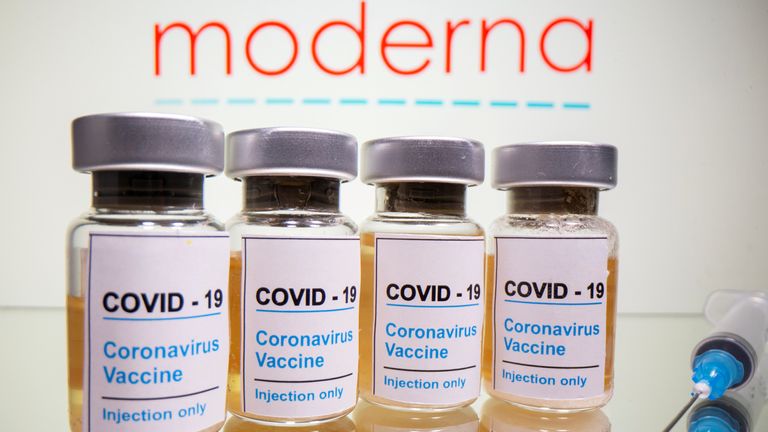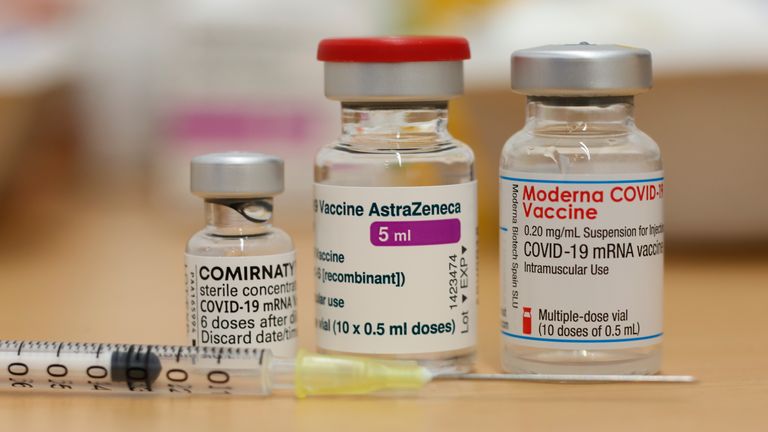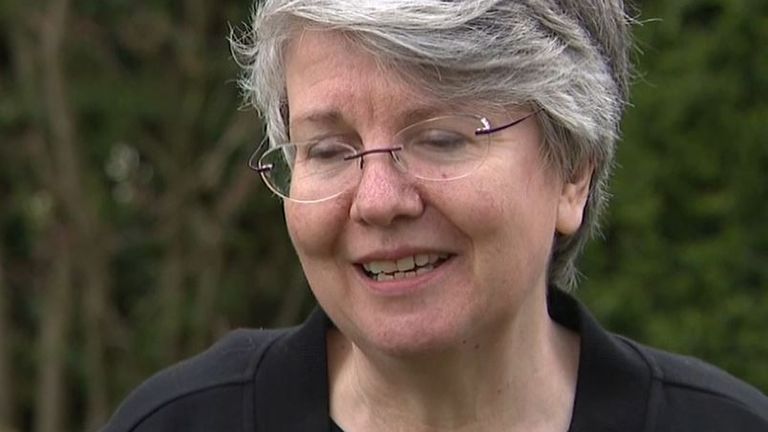A study assessing the benefits of mixing and matching coronavirus vaccines has been extended to include the Moderna and Novavax jabs.
The Com-Cov study, led by the University of Oxford, has been investigating the immune responses of volunteers given a dose of the AstraZeneca vaccine followed by the Pfizer jab - and vice versa.
The additional study will seek to recruit adults aged over 50 who have received their first dose in the past eight to 12 weeks.
The volunteers, who will have received either an AstraZeneca or a Pfizer dose, will be randomly allocated to receive either the same vaccine for their second jab, or a dose of the Moderna or Novavax vaccines.
Six new "arms" of the trial will each recruit 175 candidates, adding a further 1050 volunteers into programme.
If someone is known to have had COVID-19 they are not eligible for enrolment.
Researchers will be looking for adverse reactions and the immune system responses to these new combinations of vaccines.
The trial is not designed to show if the vaccines are effective at preventing disease.
The research will take place across eight sites in the UK.
The University of Oxford has said the intent of the study is to show that mixing is not substantially worse than not mixing.
It will compare the immune system responses to the gold-standard responses reported in previous clinical trials of each vaccine.
If the study shows promising results, regulators would formally assess the safety and efficacy of any new vaccination regimen before it is rolled out to patients.
Matthew Snape, associate professor in paediatrics and vaccinology at the University of Oxford and chief investigator on the trial, said: "The focus of both this and the original Com-Cov study is to explore whether the multiple COVID-19 vaccines that are available can be used more flexibly, with different vaccines being used for the first and second dose.
"If we can show that these mixed schedules generate an immune response that is as good as the standard schedules, and without a significant increase in the vaccine reactions, this will potentially allow more people to complete their COVID-19 immunisation course more rapidly.
"This would also create resilience within the system in the event of a shortfall in availability of any of the vaccines in use."
The UK has secured 100 million doses of the AstraZeneca vaccine, 40 million doses of the Pfizer vaccine, 60 million doses of the Novavax jab, and 17 million doses of the Moderna jab.
Novavax has not been given the green light for use in the UK but the company has applied for approval.
Professor Snape will explain at a briefing on Wednesday that Novavax is different from other vaccines and so it is a good idea to include it in the additional study.
Unlike the other jabs, which work by tricking the body's cells to manufacture the parts of the virus that then trigger the immune system, it combines an engineered protein from the virus that causes COVID-19 with a plant-based carrier to trigger the immune system directly.
Professor Snape said the J&J vaccine, which also has not yet been approved for use in the UK, is a singe-dose treatment and is therefore not useful for this trial.
The results from the initial Com-Cov study, which began in February, are due in around a week's time.
It involved 830 participants recruited over eight sites.
Follow the Daily podcast on Apple Podcasts, Google Podcasts, Spotify, Spreaker
The study has been extended as over-45s are now able to book their first coronavirus jab in the UK.
It comes after the government reached its target of offering a first dose to the nine most vulnerable groups - including all over-50s.
Coronavirus restrictions were eased on Monday as part of the government's roadmap out of lockdown.







